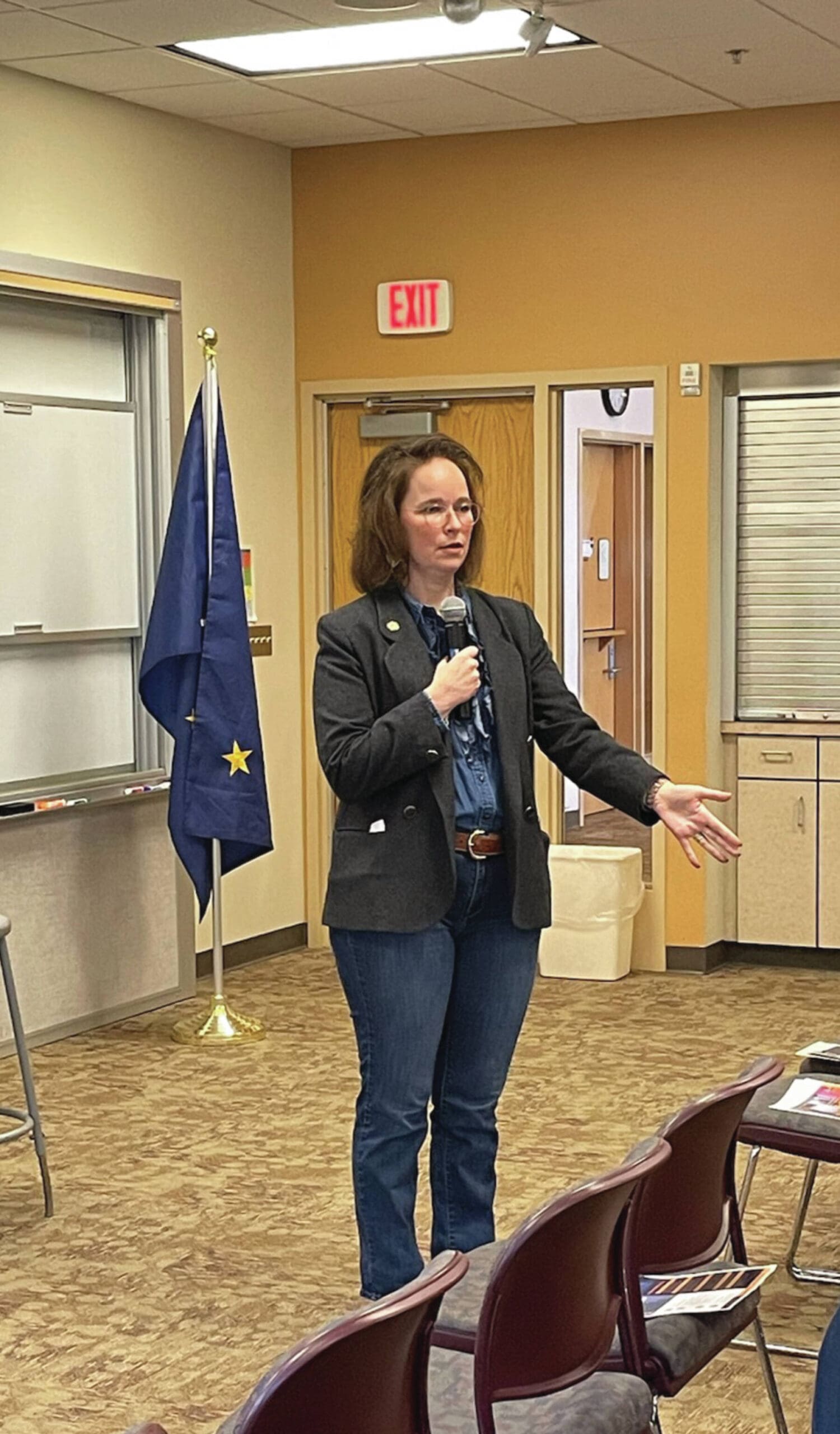People from Homer and outlying areas attended a town hall meeting with Rep. Sarah Vance to hear updates on her legislative priorities.
Approximately 80 attendees had the opportunity to ask questions and present their concerns for the region and state. The vast majority of comments from the attendees were related to Vance’s stance toward raising the base student allocation, or how much the state spends per K-12 student.
The two-hour meeting, which took place Saturday, Feb. 17 in the Kachemak Bay Campus upstairs conference room, started with a general overview of Vance’s involvement and contributions to capital budget priorities and bills related to voter registration and election integrity, natural gas and property taxes and the rising energy costs.
She also mentioned bills related to extending benefits for seniors as well as legislation aimed at sex trafficking and child abuse.
She noted that she assumed most of the constituents in the room were attending to hear more about education funding issues.
Legislation proposed to address education funding — Senate Bill 140 — is currently moving through the Alaska House. The bill proposes a number of education-related initiatives, including a $300 increase to the BSA.
Vance said she expected that number would change as the legislation is discussed.
” … I can tell you right now that is not likely to be the actual amount, there will be amendments,” Vance said.
Many education advocates in state are opposed to the $300 increase, saying it is not adequate to fill the needs of public education.
The Alaska Association of School Boards unanimously passed a resolution calling for a minimum increase of $860 to the BSA. Other education advocates, including the Kenai Peninsula Education Association, have called for a BSA increase of $1,413 — the amount it is estimated the BSA must be increased for it to have kept pace with inflation since fiscal year 2017, the Peninsula Clarion has reported.
In addition to providing a permanent increase to the BSA, S.B. 140 also includes teacher incentive programs, charter school and correspondence school support, deaf/hard of hearing support, increased school transportation funding and funding for increased internet speeds across rural schools.
Vance said she still had hesitations about the bill.
“I’m going to be very transparent with you right now. I still don’t know how I’m going to vote on this package because I don’t know how much the BSA is going to be,” she said.
“If we approved the proposed bump of the BSA all the way to the $1,413, there would be no funding available for anything else. It is also my responsibility to pass a budget that makes sure all of the other things we need are funded, too,” she said.
On Monday, the Alaska House failed to get enough votes to bring forward for discussion S.B. 140, according to reporting by the Peninsula Clarion.
As of Tuesday, House lawmakers had not taken up the bill again.
Attendees expressed concerns that the educational system is already strained due to lack of funding and that the $300 is not a large enough increase.
Winter Marshall-Allen, a local special education and behavior intervention teacher, said she felt the bill fell short.
“ … This does not meet the needs of the most basic requirements for the most vulnerable, compromised students. In order for us to put people into the other industries that you’re talking about, energy for example, that are going to make Alaska the thriving place that it has been, without support for education, nothing else can grow.”
Kenai Peninsula Borough School District Board of Education President Zen Kelly expressed concerns about the provision of the bill that would allow charter school applications to bypass the borough boards and receive certification at the state level. He said local control is what makes the charter schools in the state successful.
Other parents and educators, both past and present, noted the need to invest in Alaska youth who will be making decisions for the future.
“I think the founding component of every problem at the state level is that education is not fully funded. It’s not funded ahead of time so school districts can plan for, hire and retain teachers,” Homer City Council member Caroline Venuti said.
“I fully agree with you, Sarah, families are important but if the state is not doing its job and we can’t retain people in the professions they are trained in, the families will leave and the communities will wither. Three hundred dollars is not enough; that’s what we’re all telling you.”
Venuti also addressed concerns about the teacher incentive program taking the place of a “sound retirement program.”
Venuti explained later the teacher incentive program is legislation introduced by Gov. Mike Dunleavy in March 2023 that provides certified full-time teachers a lump sum payment in July of 2024, 2025 and 2026 if a teacher occupies a teaching position for the full school year prior to the payment.
But, as Venuti explained, it is still only a three-year program and doesn’t provide much incentive for teachers, especially in rural regions to stay any longer than that.
“Alaska’s teacher retirement strategy has been in transitions for years and it really doesn’t provide many benefits,” Venuti said.
Very few other topics were addressed at the meeting beyond S.B. 140, though there were some questions raised about how Vance had made efforts to reach out to her constituents in more remote locations, such as Seldovia.


